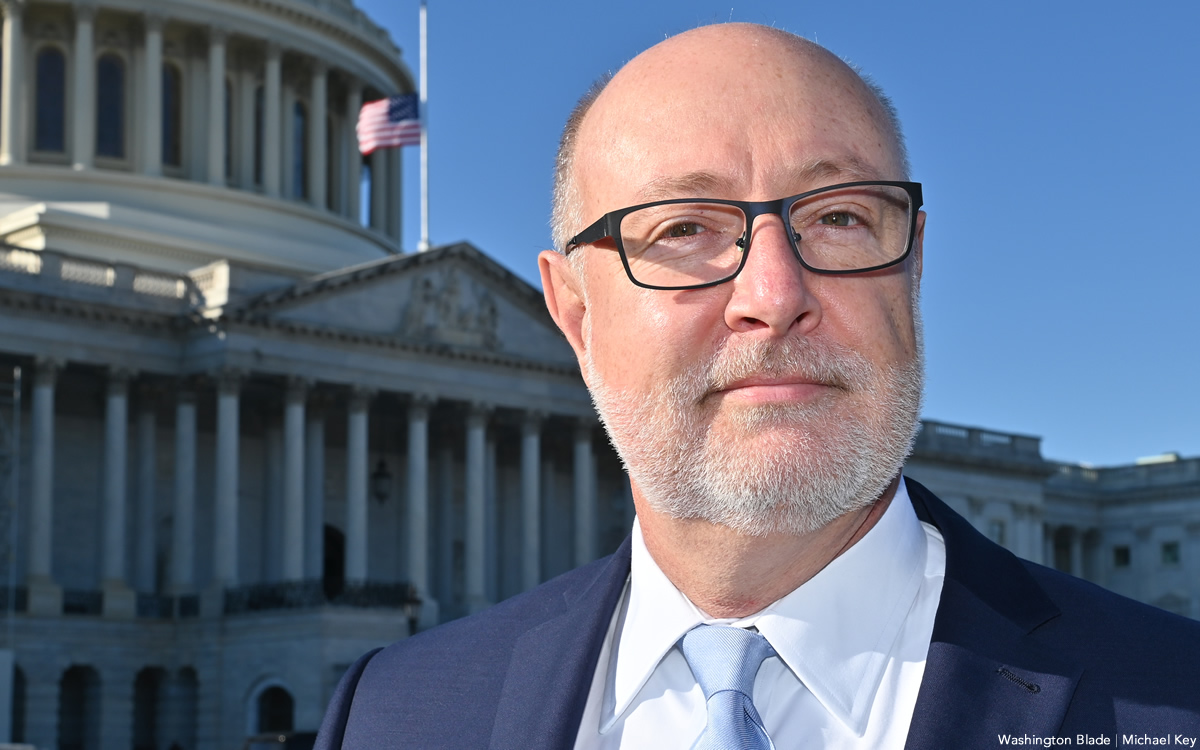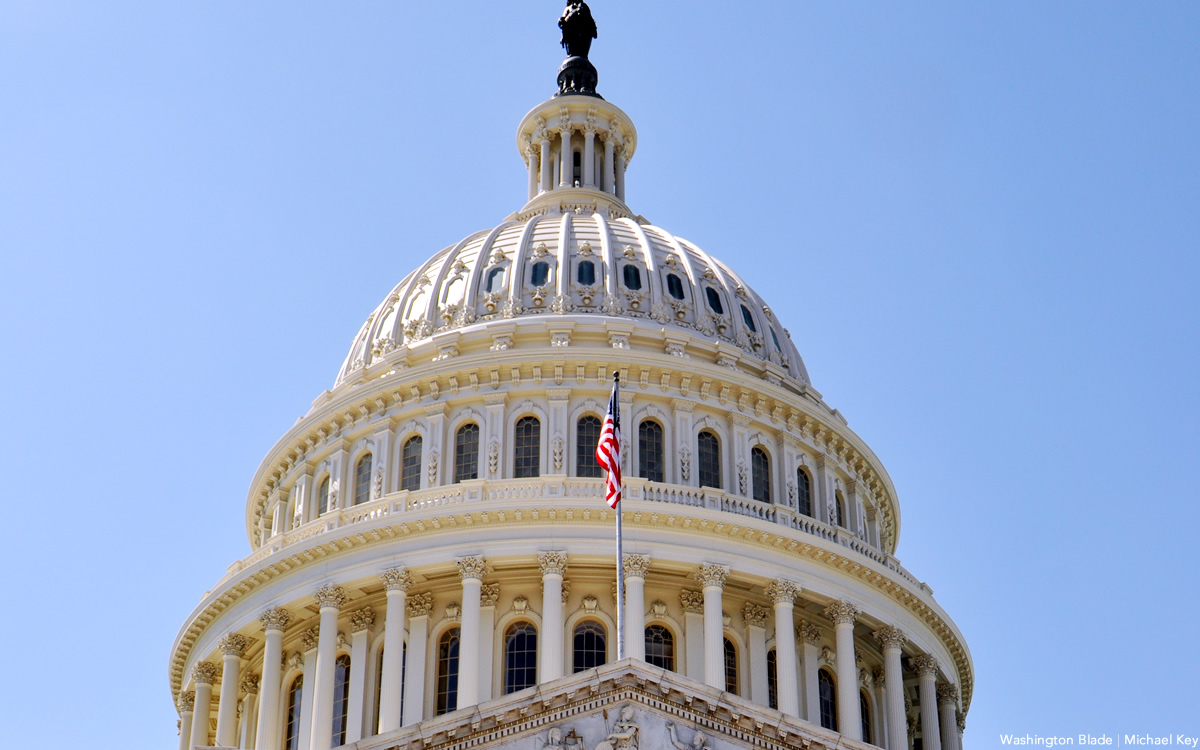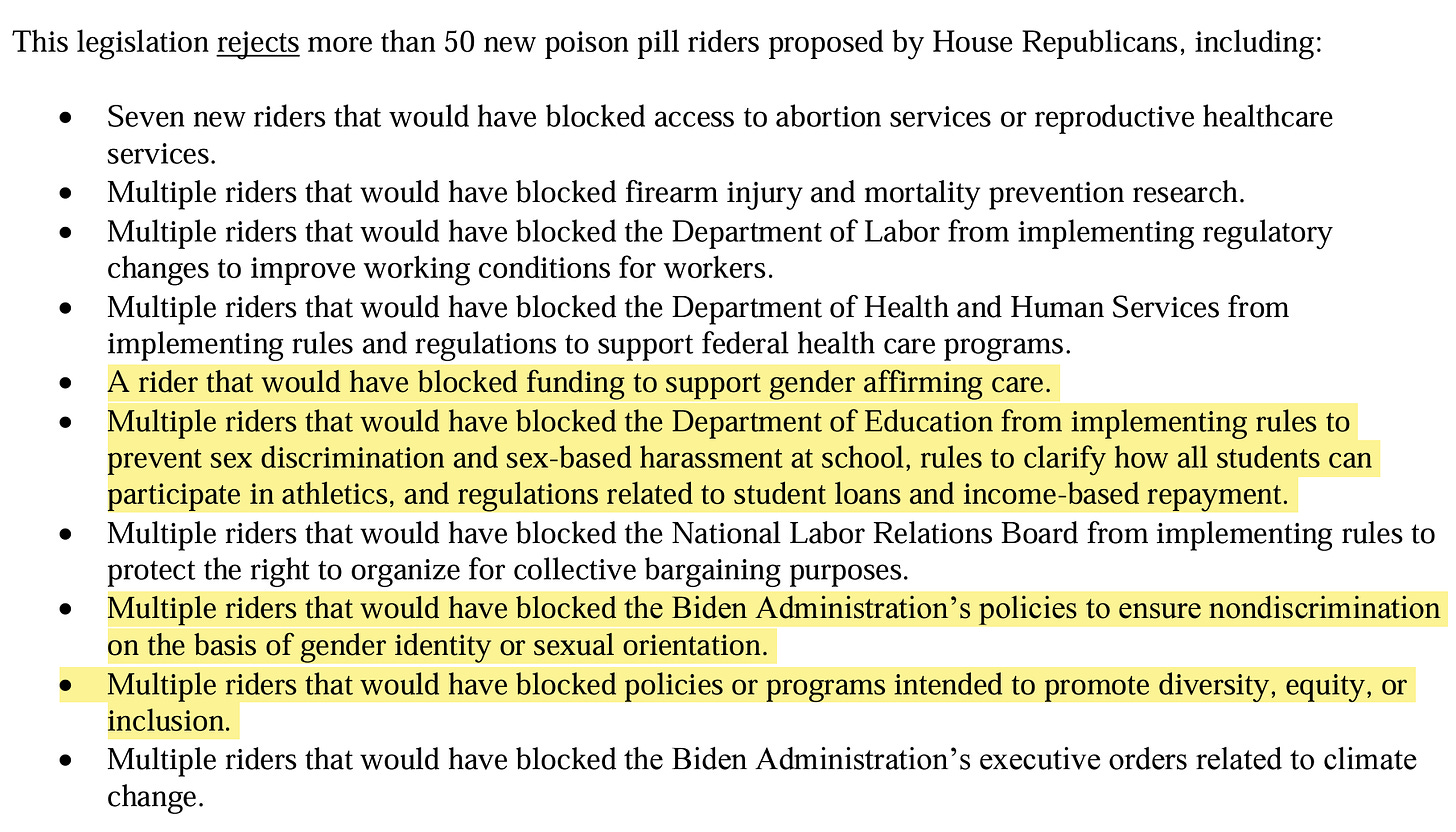Congress
Inside Marjorie Taylor Greene’s unprecedented feud with gay Hill staffer
Tim Hysom speaks publicly for first time since he became target of harassment by right-wing lawmaker

After more than 20 years in public service working behind the scenes on Capitol Hill, Tim Hysom never imagined he would be staring down the barrel of an Ethics Committee probe into whether he had brought discredit upon the U.S. House of Representatives.
Equally inconceivable was the barrage of intimidating and hateful messages from strangers that have persisted for months, which included credible threats of violence that prompted the U.S. Capitol Police to monitor Hysom’s home for concern over his and his family’s safety.
A longtime public servant whose career has included high-profile positions in the congressional offices of Democratic Reps. Adam Schiff (Calif.), Alan Lowenthal (Calif.), and Jake Auchincloss (Mass.), Hysom also spent five years at the Congressional Management Foundation working with Republican and Democratic members of the House and Senate and served on the board of the House Chief of Staff Association, first as a vice president for Professional Development and later as president of the staff organization.
Now he is still trying to piece his life and career back together after the fallout from a conflict this summer with Republican Rep. Marjorie Taylor Greene of Georgia. Part of that effort, Hysom told the Washington Blade in an exclusive interview, is to go public after months of silence to tell the story of how the firebrand congresswoman, who is poised to become a member of Republican leadership in the House next year, launched an unprecedented attack on him with the goal, he claims, of forcing him out of Capitol Hill.
Congressional staff are rarely the subject of complaints filed to the House Ethics Committee. Nor are they often otherwise embroiled in controversies and political debates among members that attract public interest and news coverage.
The story of Greene’s conflict with Hysom breaks from that precedent, serving as, potentially, a harbinger of what may come when she is seated alongside Republican leadership in the next Congress.
It started with Greene’s transphobic sign
In February 2021, after Rep. Marie Newman (D-Ill.) hung a transgender flag outside her door in the Longworth House Office Building, Greene, whose office was directly across the hallway, put up a sign that read: “There are TWO genders: MALE & FEMALE…Trust The Science!”
When a series of stickers were placed on Greene’s signs over the course of several weeks earlier this year, she referred the matter to the Capitol Police, which identified Hysom in surveillance footage as the staffer placing the stickers on Greene’s signs. Using a point of personal privilege, Greene took to the House floor in June to rail against Hysom – then Auchincloss’s chief of staff – while admonishing the Justice Department for declining to bring charges against him.
Greene subsequently announced in July that she filed a complaint with the House Ethics Committee against Hysom.
Those events earned some media attention at the time, mostly from right-wing outlets, but the full story and its fallout have not yet been revealed. Nor has Hysom responded publicly before now, either through his social media or in comments to the press.
Asked for comment, Greene shared the following statement with the Blade:
“This has nothing to do with his sexual preference or orientation, or the fact that he’s married to a man, but it has everything to do with the fact that he attacked me, a Member of Congress, and my First Amendment freedom of speech, my Christian beliefs and values. He also broke the law vandalizing my office’s property multiple times, was caught on camera, and continued to do it. He’s been arrested. Unfortunately, the Department of Justice dropped the charges, but I think they should have pressed charges. It’s outrageous that a chief of staff would continue such illegal behavior, and he should be no longer employed in any office in the federal government.”
Hysom pointed out that in the first place, Greene’s decision to hang the sign seems to be a clear violation of House rules.
While members are permitted to display flags within certain guidelines outside their offices in House office buildings, a policy updated in 2008 stipulates that: “Furnishings of any kind, including but not limited to furniture items (including sign-in/registration tables, pedestals, easels, carpets, rugs and mats); shades, drapes, and screens; artwork, exhibits and posters; and trees, flowers and other plants may not be placed in a hallway or exit access.”
“If she can violate the standing rules of the House and hang offensive and abusive material in the halls of Congress under the guise of free speech,” Hysom asked, “doesn’t the Constitution also protect my right to free speech?”
He added that Greene’s response was disproportional in the extreme. “Placing a sticker on a sign that isn’t supposed to be there in the first place is hardly a high crime or misdemeanor.”
Greene had also hung a sign that read, “Let’s go Brandon” with the hashtag “#FJB”– both slogans used on the right as substitutes for the phrase, “Fuck Joe Biden.” Hysom said many House staffers were deeply offended by the display of a message so disrespectful of the sitting president of the United States, and in a public corridor of a House government office building.
As a gay man whose religious upbringing taught the importance of love and respect as Christian virtues, Hysom was also offended when Greene hung the “there are TWO genders” sign to bully and taunt Newman.
After requesting a copy of the House’s policy governing decorations in the hallways of its office buildings, he put a sticker on Greene’s sign, which according to Hysom kicked off a back-and-forth exchange whereby Greene would occasionally respond to the stickers by writing a message on the poster back to Hysom, once signed (heart) MTG. Most of the stickers contained Bible verses to point out her hypocrisy, he said. When Hysom would put a sticker on one of Rep. Greene’s posters, she would take down the posters to replace them with new ones.
One sticker Hysom placed on Greene’s gender poster read, “True Disciples of Christ don’t say the things you say, act the way you act, or treat people the way you treat people.”

Greene’s escalation of the matter came as a surprise, Hysom told the Blade. “The reality is that I challenged her hate speech in the halls of the Congress in a way that triggered her and caused her to have a meltdown,” he said. “Her response was to send a like-minded horde of her followers to harass and threaten me.” He added, “Regrettably, there are likely to be other waves of hate and vitriol, but I won’t be intimidated by her or her hate-filled acolytes.”
First, pursuant to the investigation by Capitol Police, likely conducted at Greene’s behest, an affidavit in support of an arrest warrant was issued. (Contrary to what Rep. Greene told the Blade, Hysom was never arrested or charged with a crime.)
Then, in her 31-minute speech denouncing Hysom from the House floor, Greene tried to goad Auchincloss into firing Hysom, while directing her supporters to bully and harass him.
Almost immediately, a deluge of threats and harassment started pouring in to Hysom’s personal and professional email and social media inboxes. He received a threatening letter at his home address. Many of the messages contained hateful anti-LGBTQ slurs. It continues to this day.
Now that the threats have died down, at least for now, Hysom said he is unsure whether his home is still being monitored by the Capitol Police, but the hateful messages have slowed, though they have persisted.

Amid the chaos following Greene’s speech, Lowenthal reached out to offer support to his former chief of staff and extended an offer for Hysom to return to his office in the months before the lawmaker’s planned retirement from Congress at the end of this year.
The congressman sent a statement to the Blade on his experiences working with Hysom:
“Standing up to bullies and railing against injustice, while demanding equity and grace in how we treat one another, are ideals I have always aspired to. And yes, sometimes that demands what my dear friend John Lewis called ‘good trouble.’ Tim has always fought for these same ideals of justice and equality and he has demonstrated his above-and-beyond dedication to this institution more times than I can count.
“I have been honored to have him as a member of my staff, just as each of my staff have benefited, both personally and professionally, from working with him. The foundation of my success in Congress has been the efficient and effective office that Tim built for me and kept running smoothly through his more than eight-year tenure with my office. And despite his commitment to my office, he has also dedicated himself to the betterment of not only this institution as a whole, but to the development of the professional staff that works here.
“I can say without hesitation that Congress is a better institution for Tim being a part of it.”
For her part, Greene accused Hysom of targeting her for her gender and her religious beliefs. Among the messages she shared on Twitter were:
“Soon Biden’s DOJ will prosecute people for hate crimes if they dare try to stop trans strippers dressed in drag from grooming children at schools & in public, but they refuse to prosecute @JakeAuch COS Tim Hysom for hate crimes against my faith & gender and my district’s beliefs.”
And: “.@JakeAuch did you know your COS Tim Hysom repeatedly targeted me? I have some of the highest number of death threats in Congress, with approx 60 official threats just this year and one man on trial for trying to kill me. Do you or Tim Hysom know any of them? Is Hysom one?”
Hysom assured the Blade he has not sent and would never send threatening messages to the congresswoman. Apart from the exchange over the stickers, he said he has never had any contact with Greene or her office.
The poster Greene took to the House floor on June 21 – which misleadingly accuses Hysom by name of criminal conduct with photos of him taken from surveillance footage – was hung outside Greene’s office in Longworth since that time. (It is unclear whether she brought it to her new space in the Cannon House Office Building.)
Ahead of Lowenthal’s retirement, Hysom said he’s actively job hunting. “I have some prospects, but nothing has materialized definitively yet,” he said. “It’s a bit scary, but I remain hopeful. I’m an institutionalist and I love the House. I’ve spent more than 20 years trying to build up the Congress and Rep. Greene has spent every waking minute of the last two years trying to tear it down.”
In terms of the impact of his conflict with Greene, Hysom said, “Nobody on my side of the aisle puts any credence whatsoever into what Congresswoman Greene says, so it’s not like people on my side of the aisle believe putting a sticker on her poster was a ‘hate crime’ or that a Bible verse on a sticker somehow means that I hate women or Christians. On the contrary, I simply tried to point out that what the congresswoman says and does are not at all Christ-like.”
Still, the last thing Hysom was looking for was a public feud with the congresswoman. “Nobody that knows me would consider me a rabble rouser,” he said. “Walking by those hateful signs every single day just finally got to me. I couldn’t let it go unanswered.”
And then, there’s the matter of the House Ethics Committee investigation.
“The committee is still deliberating on what to do next. These are uncharted waters,” Hysom said. Republicans on the committee are perhaps unlikely to cross Greene and vote with Democrats to dismiss the complaint, while Democrats would be unlikely to assist Greene in her quest to further punish Hysom by voting with Republicans to move forward and impanel an investigative subcommittee.
With the members deadlocked, the matter could die with the end of the current Congress, though the committee could vote to extend the case into the upcoming 118th Congress.
The House Ethics Committee declined to comment.

Congress
Lawmakers champion drug policy reforms at National Cannabis Policy Summit
Congressional leaders pledged their support for decriminalization

Speaking at the 2024 National Cannabis Policy Summit on Wednesday, congressional leaders pledged their support for proposals to remedy the harms of America’s War on Drugs while protecting cannabis users and cannabis businesses that are operating under a fast-evolving patchwork of local, state, and federal laws.
Overwhelmingly, the lawmakers who attended the conference at the Martin Luther King Jr. Memorial Library in D.C. or delivered their remarks virtually were optimistic about the chances of passing legislative solutions in the near-term, perhaps even in this Congress.
Participants included U.S. Sens. Raphael Warnock (D-Ga.), Jeff Merkley (D-Ore.), Elizabeth Warren (D-Mass.), and Senate Majority Leader Chuck Schumer (D-N.Y.), along with U.S. Reps. Eleanor Holmes Norton (D-D.C.), Earl Blumenauer (D-Ore.), and Barbara Lee (D-Calif.), who co-chairs the Congressional Cannabis Caucus and was honored at the event with the Supernova Women Cannabis Champion Lifetime Achievement Award. Republicans included an aide for U.S. Rep. David Joyce (R-Ohio) who was featured in an afternoon panel discussion about the cannabis policy landscape on Capitol Hill.
Each of the members have long championed cannabis-related policy reforms, from Merkley’s SAFER Banking Act that would allow cannabis businesses to access financial services (thereby affording them the critically important protections provided by banks) to Lee’s work throughout her career to ameliorate the harms suffered by, particularly, Black and Brown communities that have been disproportionately impacted by the criminalization of marijuana and the consequences of systemic racism in law enforcement and the criminal justice system.
The lawmakers agreed America is now at an inflection point. Democratic and Republican leaders are coming together to support major drug policy reforms around cannabis, they said. And now that 40 states and D.C. have legalized the drug for recreational or medical use, or both, the congress members stressed that the time is now for action at the federal level.
Last summer, the U.S. Department of Health and Human Services issued a formal request to re-categorize marijuana as a Schedule III substance under the rules and regulations of the Controlled Substances Act, which kicked off an ongoing review by the Biden-Harris administration. Since the law’s enactment in 1971, cannabis has been listed as a Schedule I substance and, therefore, has been subject to the most stringent restrictions on and criminal penalties for its cultivation, possession, sale, and distribution.
Merkley acknowledged that re-scheduling would remedy the Nixon administration’s “bizarre” decision to house marijuana under the same scheduling designation as far more harmful and addictive drugs like heroin — and noted that the move would also effectively legalize biomedical research involving cannabis. However, the senator said, while re-scheduling “may be a step in the right direction, it’s not de-scheduling” and therefore would not make real inroads toward redressing the harms wrought by decades of criminalization.
Likewise, as she accepted her award, Lee specified that she and her colleagues are “working night and day on the legalization, not re-scheduling.” And her comments were echoed by Warren, who proclaimed in a prerecorded video address that “de-scheduling and legalizing cannabis is an issue of justice.”
Congressional Republicans have blocked legislation to legalize marijuana, the Massachusetts senator said, “and that is why the scheduling is so important,” as it might constitute a “tool that we can use to get this done without Republican obstruction.”
Warren, Merkley, and Schumer were among the 12 Senate Democrats who issued a letter in January to the U.S. Drug Enforcement Administration requesting transparency into its re-scheduling process while also, more importantly, demanding that the agency fully de-schedule cannabis, which would mean the drug is no longer covered by the Controlled Substances Act.
However, in a possible signal of political headwinds against these efforts, their Republican colleagues led by U.S. Sen. Mitt Romney (R-Utah) responded with a letter to DEA Administrator Anne Milgram “highlighting concerns over HHS’s recommendation to reschedule marijuana from a Schedule I to Schedule III-controlled substance.” The GOP signatories, all of whom serve on the Senate Foreign Relations Committee, also sought to “underscore the Drug Enforcement Administration’s (DEA) duty under the Controlled Substances Act (CSA) to ensure compliance with the United States’ treaty obligations under the Single Convention on Narcotic Drugs.”
As Norton noted during her prepared remarks, elected Democrats are not necessarily always on the same page with respect to expanding access to economic opportunity facilitated by cannabis. For instance, though President Joe Biden had promised, during his State of the Union address this year, to direct his “Cabinet to review the federal classification of marijuana, and [expunge] thousands of convictions for mere possession,” Norton blamed Biden along with House Republicans for provisions in the federal budget this year that prohibit D.C. from using local tax dollars to legalize cannabis sales.
A non-voting delegate who represents the city’s 690,000 residents in the House, Norton called the president’s position “deeply disappointing,” particularly considering his record of supporting “D.C. statehood, which would allow D.C. to enact its own policies without congressional interference” and grant its residents voting representation in both chambers of Congress. She added that the majority of Washingtonians are Black and Brown while all are held responsible for “the obligations of citizenship including paying federal taxes.”
Norton said the city should also have the power to grant clemency for crimes committed in the District, including cannabis-related crimes — power that, currently, can only be exercised by the president.
Some Republican lawmakers have been at the forefront of efforts to reform harmful cannabis regulations. For instance, a participant in a mid-afternoon panel pointed to the CURE Act, a bill introduced by U.S. Reps. Nancy Mace (R-S.C.) and Jamie Raskin (D-Md.) that would prohibit the federal government from denying security clearances based on applicants’ past or current use of cannabis.
While securing statehood for D.C. and de-scheduling cannabis via legislation or administrative action are perhaps, at least for now, a heavy lift, Merkley pointed to promising new developments concerning his SAFER Banking Act.
The Oregon senator first introduced the measure, then titled the SAFE Banking Act, in 2019, and he said the legislation’s evolution into its current iteration was difficult. “Regulators don’t want to be told what to do,” Merkley said, and negotiations with these officials involved “nitty-gritty arguments over every word.”
Pushback also came from one of Merkley’s Democratic colleagues. In September, Warnock, who is Georgia’s first Black U.S. senator, voted “no” on the 2023 version of the SAFER Banking Act, writing: “My fear is that if we pass this legislation, if we greenlight this new industry and the fees and the profits to be made off of it without helping those communities” most harmed by the War on Drugs “we will just make the comfortable more comfortable.”
Warnock’s statement followed his pointed remarks expressing concerns with the legislation during a Senate Banking Committee hearing.
“Let me be very clear,” he said, “I am not opposed to easing or undoing federal restrictions around cannabis. And I would support all of the provisions and reforms in this legislation if paired with broader cannabis reforms that substantively address the issue of restorative justice. This bill does not do that.”
At this point, however, the latest version of the SAFER Banking Act has advanced out of committee and earned the support of Senate leaders including Schumer and much of the Republican conference.
“This is the moment,” he said. “Let’s not let this year pass without getting this bill — the safer banking bill — through the House, through the Senate, and on the president’s desk.”
In her remarks, Lee also discussed the importance of business and industry-wide reforms like those in Merkley’s bill.
“We have to make sure that the cannabis industry is viewed by everyone, especially our federal government, as a legitimate business,” Lee said. “Legitimate, which deserves every single aspect of financial services that any legitimate business deserves and has access to.”
Like Warnock, the congresswoman also highlighted how these financial and business considerations intersect with “equity issues,” as “those who have been most impacted by this horrible War on Drugs” must “become first in line for the businesses and for the jobs and for the economic opportunity the cannabis industry provides.”
Reflecting on her experience introducing the Marijuana Justice Act in 2019, which was Congress’s first racial justice cannabis reform bill, Lee remembered how “everyone was like, ‘why are you doing this? It’s politically not cool.’” Her legislation sought to end the federal criminalization of marijuana, expunge the criminal records of those convicted of cannabis-related crimes, and reinvest in communities that have suffered disproportionately from the War on Drugs.
The congresswoman said she explained to colleagues how the bill addressed “many, many layers” of often-intersecting problems linked to federal cannabis policy, telling them: “This is a criminal justice issue, a racial justice issue, an issue of equity, a medical issue, a veterans’ issue, and an issue of economic security.”
Two years later, with a 220-204 vote, the House successfully passed the Marijuana Opportunity Reinvestment and Expungement Act, a comprehensive bill introduced by U.S. Rep. Jerry Nadler (D-N.Y.) and to the Senate by then-U.S. Sen. Kamala Harris (D-Calif.). The measure included Lee’s Marijuana Justice Act.
“This bill is the product of many, many years of advocacy for federal cannabis reform and equity,” she said in a statement celebrating the bill’s passage. “Make no mistake: This is a racial justice bill. It’s about the thousands of people of color who sit in jail for marijuana offenses while others profit. It’s about finally repairing the harms of the War on Drugs on communities and families across the country.”
“We’ve come a long way,” she told the audience on Wednesday. “And now we have a long way to go.”
Congress
House passes spending bill as Greene threatens to oust Johnson
51 of 52 anti-LGBTQ riders were defeated

The U.S. House of Representatives averted a government shutdown on Friday with a vote of 286-134 to pass the $1.2 trillion spending bill, over the objections of hard-right members like U.S. Rep. Marjorie Taylor Greene (R-Ga.).
The congresswoman subsequently filed a motion to remove House Speaker Mike Johnson (R-La.), who is himself an ultraconservative legislator. The move marked the second time in six months that the party has called for a vote to oust their own leader.
“Today I filed a motion to vacate after Speaker Johnson has betrayed our conference and broken our rules,” said Greene, who refused to say whether she would call up the resolution to call for a snap vote, which likely means the matter will be delayed until after the two-week recess.
Greene and Johnson are at odds over the content of the minibus appropriations package, with the congresswoman calling it a “Chuck Schumer, Democrat-controlled bill” that does not contain conservative policy demands on matters like immigration and LGBTQ issues.
The speaker, meanwhile, proclaimed, “House Republicans achieved conservative policy wins, rejected extreme Democrat proposals, and imposed substantial cuts while significantly strengthening national defense.”
With respect to anti-LGBTQ riders submitted by Republican members, more than 50 were ultimately stripped from the bill, which the Human Rights Campaign celebrated as “a victory,” crediting lawmakers for their “bipartisan, bicameral negotiations.”
Of the 52 anti-LGBTQ riders, only one survived in the $1.2 trillion package passed on Friday: A ban on flying Pride flags at U.S. embassies.
Congress
Massive defeat for anti-trans, anti-LGBTQ riders in spending bill
Proposal has only one rider that would target community

On Thursday, Congress unveiled the much-anticipated spending bill to avert a government shutdown. The bill, which includes funding for major government departments such as Health and Human Services and Education, featured fierce negotiations over conservative “policy riders.”
These policy riders included bans on coverage for gender-affirming care, DEI bans, sports bans and more. Despite some indications that Democrats might compromise due to the sheer number of conservative policy riders, it appears those fears did not come to fruition. Democrats held firm in negotiations, and the most impactful anti-trans and anti-LGBTQ riders were nowhere to be found.
One policy rider proposed for the Food and Drug Administration would have defunded any hospital that “distributes, sells or otherwise uses drugs that disrupt the onset of puberty or sexual development for those under 18,” a measure targeting not only transgender youth but also those experiencing precocious puberty.
Another rider sought to bar any government funding toward “surgical procedures or hormone therapy for the purposes of gender-affirming care” in the Department of Health and Human Services. This move would have significantly impacted private and subsidized insurance in the Healthcare Marketplace. It also aimed to bar the enforcement of President Joe Biden’s executive order titled “Preventing and Combating Discrimination on the Basis of Gender Identity,” which broadened anti-discrimination protections for trans individuals.
Additional riders included bans on funding for any organization that “promotes transgenderism,” Title IX protections for trans youth, bans on legal challenges against states over anti-LGBTQ+ laws, book bans, DEI bans and more.
In total, over 40 riders were proposed and negotiated in the spending bills. None of these were found in the final bill.
Ultimately, the final spending bill released contained only a single anti-LGBTQ rider: A ban on Pride flags being raised or displayed above foreign embassies. The policy, while certainly qualifying as anti-LGBTQ and a regression to Trump-era policies, notably does not bar personal displays of Pride flags by embassy workers.
In the past, some embassies have gotten around such bans by not “flying a flag over the embassy” but rather, painting portions of the embassy in rainbow colors or draping flags on the side of buildings.
News of the defeat of the most impactful anti-trans and anti-LGBTQ riders comes after a significant push from Equality Caucus Democrats and the Biden administration against the riders. “As you negotiate government funding for Fiscal Year 2024 (FY24), we write to strongly urge you to reject any attempts to include anti-LGBTQ+ provisions in any final FY24 funding agreement,” said a letter signed by 163 representatives on behalf of the Congressional Equality Caucus to the Biden administration.
However, Republicans also pushed hard for their inclusion. In a shutdown threat issued Feb. 21 from the House Freedom Caucus, Republicans indicated that bans on gender affirming care and trans participation in sports were necessary to prevent a potential shutdown.
Previously, U.S. Dan Crenshaw (R-Texas) stated that such bans are the “hill we will die on.” In a report published by Axios, one Republican lawmaker stated, “People are predicting a shutdown even if it’s just for a few days.” Others concurred, citing gender affirming care riders as one of the potential reasons for such a shutdown.
Many anti-LGBTQ leaders in the Republican Party reacted negatively to the bill. U.S. Rep. Matt Gaetz (R-Fla.) expressed anger at funding for the New Jersey Garden State Equality in Education Fund, calling it “force feeding the LGBT agenda in schools” and stating that it enables “gender mutilation surgeries in minors,” “biological men” in women’s bathrooms and trans participation in sports.
U.S. Rep. Marjorie Taylor Greene (R-Ga.) decried the lack of a DEI ban. U.S. Rep. Andrew Clyde (R-Ga.) stated that Republicans “surrendered” to Democrats on hormone therapy. The House Freedom Caucus published a lengthy list of healthcare and equality centers that the budget would fund, urging the GOP to vote “no” and to shut down the government.
In a press release published by House Appropriations Democrats, they stated that the bill rejected over a hundred poison-pill riders, many of which targeted LGBTQ people. For example, the Labor-HHS-Education portion of the bill blocked provisions around gender affirming care, sports bans and nondiscrimination.
See the House Appropriations Democrats statement:
The bill must pass by Friday evening to avert a government shutdown, though the impacts of such a shutdown would likely not be felt until Monday. If passed, the bill would keep the government funded through September, at which point all of the riders could resurface during the peak of the 2024 presidential election.
However, for the next several months, LGBTQ riders will not pose a significant threat in a year where trans and queer individuals have faced attacks at historic levels.
****************************************************************************

Erin Reed is a transgender woman (she/her pronouns) and researcher who tracks anti-LGBTQ+ legislation around the world and helps people become better advocates for their queer family, friends, colleagues, and community. Reed also is a social media consultant and public speaker.
******************************************************************************************
The preceding article was first published at Erin In The Morning and is republished with permission.
-

 State Department2 days ago
State Department2 days agoState Department releases annual human rights report
-

 Maryland4 days ago
Maryland4 days agoJoe Vogel campaign holds ‘Big Gay Canvass Kickoff’
-

 Politics3 days ago
Politics3 days agoSmithsonian staff concerned about future of LGBTQ programming amid GOP scrutiny
-

 The White House1 day ago
The White House1 day agoWhite House debuts action plan targeting pollutants in drinking water










